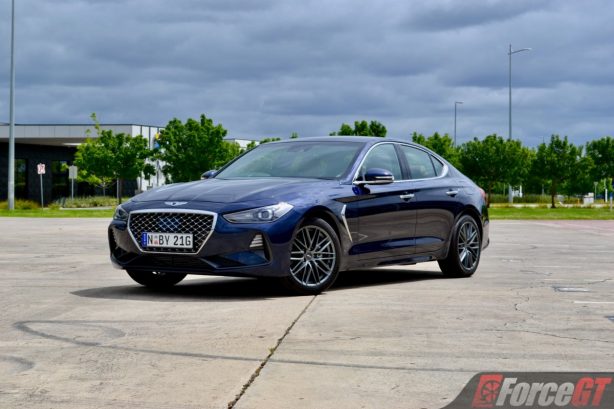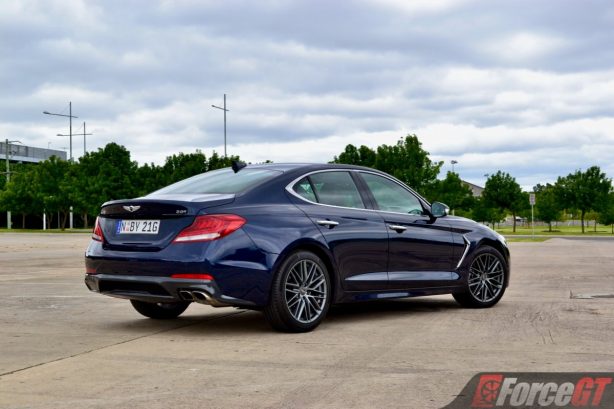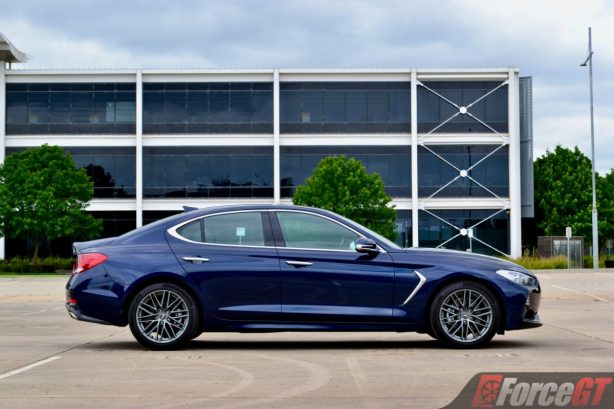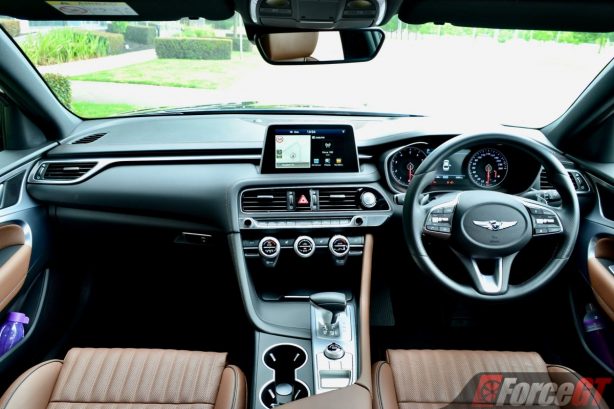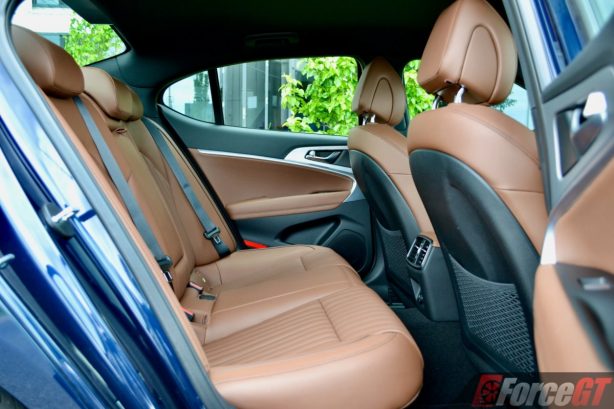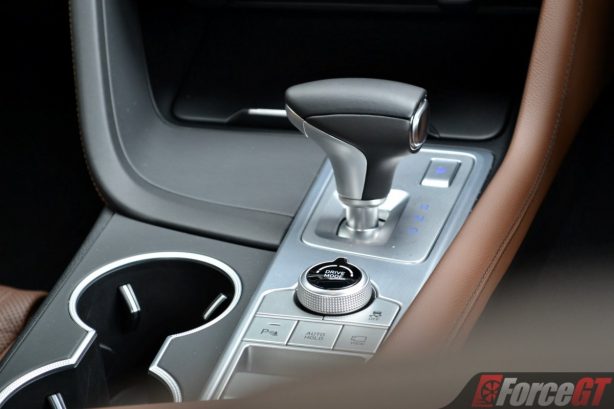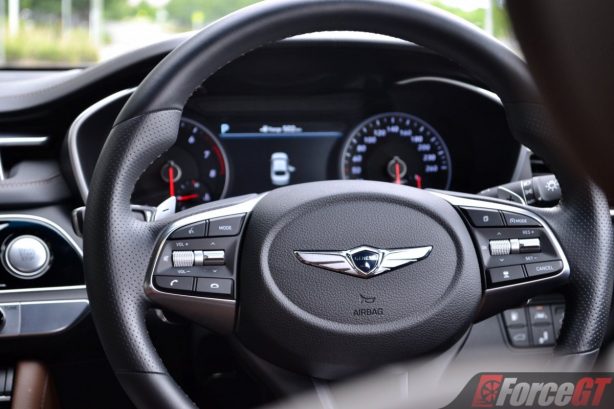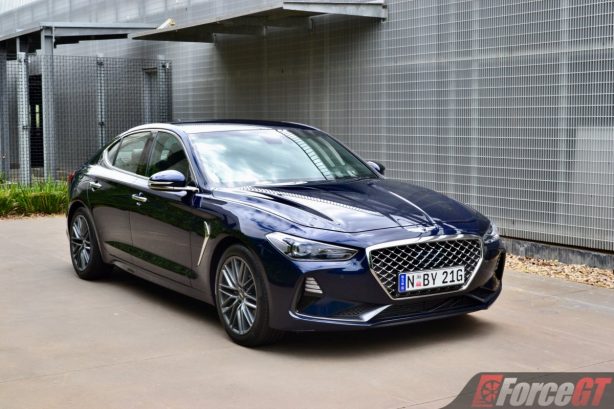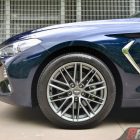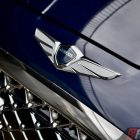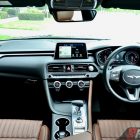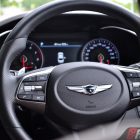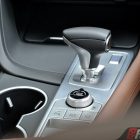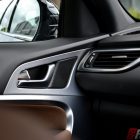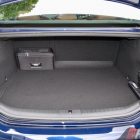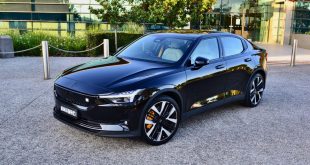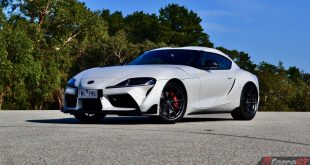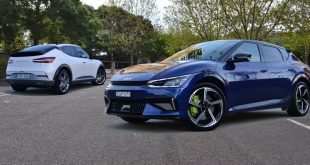The Genesis luxury sub-brand of Hyundai has been gunning for premium customers since 2015 with the brand introductory Hyundai Genesis medium sedan. A commendable first effort by the South Korean brand, it was popular amongst premium chauffeurs and private buyers who were drawn to its excellent value for money. When the brand got on to a bit of momentum a few years later, the Hyundai Genesis was given a subtle update and its name changed to Genesis G80.
While the G80 has done well in raising awareness of the Genesis brand, there was really a need for something sportier and more accessible to truly penetrate the premium market.
And Genesis knew what they needed and out came the more compact G70 sports sedan. There is no messing around with this one, as the G70 is designed to go head-to-head with iconic premium saloons like the BMW 3 Series and Mercedes-Benz C-Class.
You know Genesis was dead serious in taking on the best in class when they hired former BMW head of engineering Albert Biermann to lead chassis development and dynamics tuning, and poached former Bentley designer Luc Donckerwolke to oversee design.
It is no surprise the G70 is off to a good start, with handsome styling that looks every bit as premium as how Genesis had aimed for. Granted, there are hints of Jaguar and Lexus at the front, and a whiff of C-Class at the rear, not to mention the Bentley-esque logo, yet the G70 manages to stand out and even turn quite a lot of heads.
But there is only that much good design can do. To ensure a good fighting chance, Genesis has brought the full G70 line-up to Australia, offering customers six variants and two powertrain options.
Range and Pricing
Kicking off the range is the G70 2.0T we tested which is priced from $59,300. Standard features on the 2.0T includes Australian tuned suspension, 18-inch wheels, Genesis Connected Services, a Smart Boot with hands-free opening, 12-way powered and heated front seats, tyre pressure monitoring, an 8.0-inch multimedia unit with satellite navigation, DAB+ digital radio and Apple CarPlay/Android Auto, dual-zone climate control and wireless (Qi standard) phone charging.
Stepping up to the $63,300 2.0T Sport adds Brembo brakes with four-piston front and two-piston rear calipers, 19-inch alloys wrapped in Michelin Pilot Sport 4 tyres, a mechanical limited-slip differential, Sport exterior and interior styling elements and sport instrumentation.
The $69,300 2.0T Ultimate further gains Nappa leather trim, ventilated front seats with 16-way driver’s seat adjustment, a driver position memory system, heated outboard rear seats, a heated steering wheel and power-adjustable steering column.
The G70 Ultimate also features a Head-Up Display, Surround View Monitor, Adaptive Headlights, 15-speak Lexicon by Harman premium audio and panoramic sunroof.
All 2.0T variants are powered by a 2.0-litre direct-injected turbocharged four-cylinder petrol producing 179kW and 353Nm of torque, and paired with an eight-speed automatic driving the rear wheels. It is capable of dashing from 0-100km/h in a claimed 5.9 seconds with launch control before hitting a limited top speed of 240km/h.
Meanwhile, the 3.3T G70 range opens with the Sport at $72,450. It shares its feature list with the 2.0T Sport but adds dual exhaust with oval chrome tips, variable adaptive suspension, variable gear ratio steering rack, torque vectoring, ECO Coasting mode and dark chrome rear lower diffuser garnish.
Next up is the 3.3T Ultimate (read review) which is priced from $79,950 that brings additional sports instrumentation, while the identically priced 3.3T Ultimate Sport adds sport dark chrome exterior package, including Genesis ‘Crest’ grille, front bumper lower garnish, window frame and belt-line moulding, mirror base, door handles, front guard vent garnish and rear diffuser garnish.
The flagship model also features 19-inch sport alloy wheels in dark grey, sport quilted seats and door trims with colour contrast stitching, black headlining and alloy pedals.
All 3.3T models pack a potent 3.3-litre twin-turbo direct-injected V6 generating 272kW and 510Nm of torque sent to the rear wheels via an eight-speed automatic transmission.
Interior and Comfort
There is certainly a good deal of premium vibe on the inside, even on our range-opening G70 2.0T variant. The cabin is well crafted with quality materials, including generous lashing of aluminium trim inserts on the dash and door, soft leather on the seats and armrest, and metal finish on the door switches and driving controls.
Ergonomics are top notch, too, a trait no doubt inherited from the Hyundai family gene pool. All controls are within easy reach and located where you expect them to be, while the instrument cluster presents clear and concise driving information.
Perhaps, our biggest gripe of the interior is the infotainment screen, which is lifted straight from a Hyundai. While the Hyundai system is not at all bad, we expect a luxury model like the G70 to differentiate with its own exclusive infotainment interface that is bigger than the 8.0-inch currently offered.
That said, this will soon be a thing of the past as the updated G70 will arrive next year with a revamped wide-screen infotainment system.
In terms of practicality and cabin comfort, the G70 can seat five, with plenty of room up the front but considerably tighter at the rear. Headroom is just enough for anyone under six foot, and while knee room is adequate toe room is seriously lacking.
All except for the raised middle rear seat offer good comfort and support, while twin cup holders are featured both in the front and rear (housed in the drop-down centre arm rest) to cater for occupants seated in those seats.
Unlike the big cupholders the door pockets are tight, and you will struggle to fit a large water bottle in them.
Further back, the boot space of 330 litres is way down on all key rivals, not helped by the 60/40 split folding rear seats (usually 40/20/40 split for premium cars).
Driving Impression
The 2.0-litre boosted four-pot in our 2.0T test car is a sweet little unit. With 179kW peaking at 6200rpm and 353Nm on tap from just 1400rpm, it feels sprightly and eager in most proceedings, with no noticeable lag or delay. It is right up there in terms of refinement, too, with it smooth and devoid of harshness for the most part.
The eight-speed automatic the engine is hooked up to is equally silky in its operation, and its intelligence in serving up the right gear for the right situation is hard to fault either. While there is hardly a need to take it out of auto, the steering wheel paddles are there should you desire to change gears manually.
The steering has good weightage, though there is not much in terms of road feedback – a common trait of electric-steer. But the weakest link is in the brakes – the brake pedal to be exact. It is too touchy, meaning it grabs right from the top of the pedal with lack of progressiveness. This makes it hard to regulate braking for a smooth operation.
While the base 2.0T G70 was never intended to be an out-and-out performance sedan, we are glad to report that it can hold its own on a set of challenging back roads. The Australian-specific suspension tuning by Hyundai’s local engineers endows the G70 with highly tractable on-the-edge handling that inspires confidence. With a 1683kg kerb weight it is not exactly a light car, but it feels light-footed and nimble, with good composure and grip around corners.
The ride quality is not as firm as some of the other sports sedan we have driven, too. Unlike V6 models, four-cylinder G70 variants do not have adaptive dampers but such well judged is the damper tuning that the ride over bad surfaces or bumps is remarkably compliant.
There is some road noise on coarser country roads, but for the most part the cabin is a serene and quiet place to be travelling in.
Running Costs
All Genesis G70 models come with 5 years/50,000km complimentary scheduled servicing, 5 years/unlimited kilometre warranty and 5 years roadside assist, the best ownership program in the premium space.
The luxury brand also prides itself in offering owners the ultimate convenience when it comes to having their cars serviced. Customers never have to step foot in a service centre (unless they want to). Genesis offers a pick and delivery service come service time with the customer given a Genesis loan car while theirs are being serviced.
On test and over a mix of urban and freeway use, the G70 2.0T’s trip computer indicated an average consumption of 9.9L/100km against its maker’s claimed of 8.7L/100km. While not too shabby, it is higher than the German competitors.
Verdict
Design & Comfort
Performance & Handling
Quality
Economy
Equipment & Features
OUR SCORE
4.0/5
+ Plus
- Eager powertrain
- Great ride and handling balance
- Excellent built quality
- Value for money
– Minus
- Hyundai-sourced infotainment system
- Touchy brake pedal
- Small boot
Overall
The Genesis brand may be relatively new in the luxury space, but its products portray quite the opposite, especially in the case of the G70. This is a formidable rival to the established Germans and a wake-up call for fellow challenger brands Lexus, Jaguar and Alfa Romeo.
The G70’s all-rounded appeal is hard not to like, and its class-leading ownership equation is even harder not to take notice of. You just have to shrug off that badge snobbery.
2020 Genesis G70 2.0T pricing and specification
| Price (Excl. on-road costs): | From: $59,300 As tested: $59,300 |
| Warranty: | 5 years/unlimited kilometers |
| Warranty Customer Service: | 5 years roadside assist |
| Country of Origin: | South Korea |
| Service Intervals: | 12 months/10,000km |
| Engine: | 2.0-litre turbocharged, direct-injected four-cylinder petrol: 179kW @ 6,200rpm, 353Nm @ 1,400-3,500rpm |
| Transmission: | 8-speed automatic |
| Drivetrain: | Rear-wheel drive |
| Power to Weight Ratio (W/kg): | 108.7 |
| 0-100km/h (seconds): | Claimed: 5.9; Tested: 6.2 |
| Combined Fuel Consumption (L/100km): | Claimed: 8.7 / Tested: 9.9 |
| RON Rating: | 95 |
| Fuel Capacity (L): | 60 |
| Body: | 4-door sedan, 5 seats |
| Safety: |
|
| Dimensions (L/W/H/W-B) mm: | 4,685/1,850/1,400/2,835 |
| Turning Circle Between Kerbs: | 11.0 |
| Ground Clearance: | 130 |
| Kerb Weight (kg): | 1,683 |
| Boot Space (L): | 330 |
| Towing Capacity (kg): | Braked: 1,200/Unbraked: 750 |
| Entertainment: |
|
Competitors: Audi A4, BMW 3 Series, Jaguar XE, Lexus IS, Mercedes-Benz C-Class, Volvo S60, Alfa Romeo Giulia
 ForceGT.com Car News, Car Reviews, Video Reviews, Tuning and much more.
ForceGT.com Car News, Car Reviews, Video Reviews, Tuning and much more. 